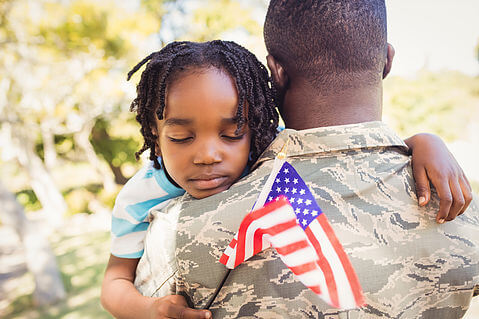Military Families
My sisters and I were all born in different states and hospitals while my father was in the navy. I had the distinct honor of being born at the Bethesda Naval Hospital, just outside of Washington D.C. As young children in the 70s and 80s, his service did not extend overseas, but we did move often domestically. By the middle of 2nd grade I had already been in four different schools.
I got REALLY good at the “fake it ‘til you make it” torture of being the new kid.

It is humbling to think about the thousands of families who are not only struggling with the day-to-day challenges of parenting, but also the added layers and burden of having a partner gone (and an uncertainty of return); plus being uprooted and transferred every few years. I am in awe.
I remember coaching a new mom whose husband was active in the military. They had a 17 month old and she was sharing how hard it is to maintain the “memory” of his dad when their child is so young. She also shared that when her partner came home, their little one seemed confused and more emotional.
Stick to the routine
We talked through strategies around routine, including sticking to a consistent, predictable routine at mornings, naps, and bedtime. When the partner comes home, it can be tempting to have a “special” occasion to keep your little one up late or skip a nap to have more time together but this can be confusing for children, leading to more meltdowns and greater emotional swings. Keep the focus on quality, connected time.
Daily doses
We also brainstormed activities for daily doses to “remember” the parent while they are away: a bulletin board with pictures and notes from the parent, an ABC book with family photos, drawing and mailing pictures, and looking at photo albums or pictures on the phone. Video and audio recordings of the deployed parent reading favorite books and singing bedtime songs are helpful to keep them in their memory and heart, along with sharing details about the parent such as,
“Mom’s favorite ice cream flavor is mint chocolate chip.” Or
“Daddy has two brothers, your uncles, and when they were little they loved to catch lightning bugs in jars.”
This made me think of more families who were struggling with military parenting challenges through different ages and stages, so I reached out to Christy Thomas, a Positive Discipline Educator, life coach, podcaster (Keep Calm Mother On), and teacher. Christy has also been the anchor to her family of three kids and to her military community during her husband’s 20+ years of active duty service. Christy shared her insight and tips from her own personal experience, along with the many conversations she has had with other military families:
—-
Julietta
Thank you Christy for sharing your expertise with our Sproutable community! What are some other tips for caregivers to ease the challenges when the other parent is deployed? What about older kids?
Christy
The first is radical generosity. I coach the caregiver at home about talking about the deployed family member as if they are Santa Claus. What I mean is, the child needs to be reminded about the goodness and love, and connection they share. It’s often in small moments like “Oh, Dad loves this song, and he would hum it to you as a baby” or “Mommy loves the color purple. You remind me of her when you wear it.“ It takes effort to be radically generous while you may be disconnected from your partner due to communication, distance, and mission essential needs.
Julietta
Radical generosity! Wow, yes. Such a powerful parenting tool to “gift” that relationship to your child. What are your thoughts about when the deployed parent comes home?
Christy
Each time a deployed parent returns, they are returning to a completely different human than they left. Sometimes it is obvious in the physical growth, but the emotional and mental growth is critical to be aware of, and it’s hidden. The best practice suggested from classes I’ve taken is to have the returning parent only be an observer and only have positive interactions for the first two weeks home. This is extremely hard since the military member is trained for action and the primary caregiver is absolutely exhausted. The military also trains service members in communication styles to fix negative moments that, while deployed, can lead to life-and-death situations. Over the last twenty years of living this life, the communication style trained in my service member is a big hurdle for reconnection when he gets home.
Julietta
Tell me more about the communication style…
Christy
The service member is trained to talk with a mission and a purpose. They are used to direct, cut-and- dried orders and statements. Emotional connection isn’t a priority for this style. They talk in terms of measurable, observable data and assessing risk. Family communication is completely different, and it takes a while to adjust for everyone. Families communicate with lots of emotion and varied volumes. It’s a whole-body way of interacting that is warm, cozy, and silly. Family communication very, very rarely needs us to go into life-and-death emergency mode.
Julietta
Community is critical for any family, especially those who include active duty and deployed soldiers. It can feel isolating when your partner is gone. What helped you?
Christy
Finding my team and lowering my standards helps me the most when my partner is deployed. My team may not be the people in the military lifestyle with me, or it might be. There are many, many free resources funded by the Department of Defense for stress management that all military families should use. Examples of those are Military One Source (free therapy!) and Chill Drills App. When I lower my standards, I accept life will be completely different for each move and each deployment. In some deployments, we had cereal for both breakfast and dinner, too often to count. We used only paper plates and changed a lot of routines from when my husband was home. My standards needed to be lowered so my stress could be lowered so my joy could be raised. My kids didn’t need me as a super serious superwoman while their dad was deployed. They needed a mom who could be present with them, connect with them, share feelings with them, and enjoy them.
Julietta
Great advice for so many parents. Christy, what about MOVING?! This was such a major part of my life, and now as a parent coach, I see that the challenges of moving also offer opportunities for children to learn executive functioning skills: organizing and categorizing as you pack and unpack, and decision making as they help and are given control and choices with new rooms. Children feel empowered when they feel capable and parents need help! What tips do you have for military families on the move?
Christy
Moving is grief. There are many, many executive function skills a kid can learn about organizing and empowering moments of being in charge of a new bedroom. Still, those come after you talk about feelings. Get everyone involved and talk about what you’re going to miss and what you’re excited about. Read as many picture books and chapter books as you can about families who move. Watch the Disney Movie Inside Out and cry together. Then, after you feel the feelings– use Google Maps to start learning about the new neighborhood before you arrive by going on pretend walks. Start singing your new address in a song so your kids can learn it. My family feels at home the moment we get our new library cards and find the friendly children’s librarian. After that, we find parks and playgrounds and reach out to the new neighbors with cookies. We don’t wait for them. Our family works to bring joy and service to each city we move to, no matter how long we get to live there.
Julietta
I am filled with gratitude for the brave Americans who are in service for our country, and for their partners who are at home with a tougher job than most. The selflessness is sobering. Thank you Christy for your wisdom and generosity!
—-
What are your tips and challenges? Add them in a comment below.

Author bio
Christy Thomas is a Positive Discipline Educator, life coach, podcaster (Keep Calm Mother On), and teacher. Christy has also been the anchor to her family of three kids and to her military community during her husband’s 20+ years of duty with the submarine force in the US Navy. She’s navigated ten moves, public school teaching in 3 states and homeschooling in 7. She knows you are exactly the right parent for your kids and wants to help you believe it with every breath you take.





Comments